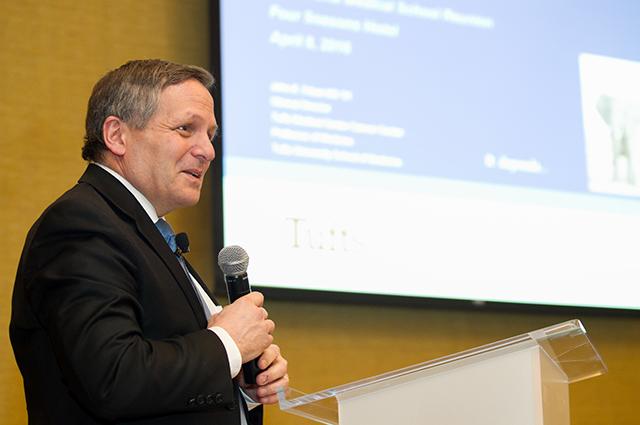-
About
- Departments & Offices
-
Academics
- Public Health
- Biomedical Sciences
- Physician Assistant
- Special Master’s (MBS)
-
Admissions & Financial Aid
- Tuition & Fees
-
Student Experience
-
- Student Resources by Program
- Academic & Student Support
- Wellness & Wellbeing
- Student Life
- Events & Traditions
-
-
Research
- Research Labs & Centers
- Tufts University-Tufts Medicine Research Enterprise
-
Local & Global Engagement
- Global Health Programs
- Community Engagement
A Meticulous Doctor, a Dedicated Volunteer
For nearly thirty years, John Erban, M81, has helped tell the stories of the School of Medicine

Tufts School of Medicine is deeply saddened to announce the passing of John K. Erban III, MD, M81 on September 2, 2020. Dr. Erban served in many roles during his distinguished career including as a clinician and researcher developing and conducting groundbreaking clinical trials on breast cancer, clinical director of Tufts Cancer Center, professor of hematology and oncology at the School of Medicine, and the medical editor of Tufts Medicine Magazine for nearly thirty years. Dr. Erban will be greatly missed by the Tufts community.
For more information about Dr. Erban and his contributions to the School of Medicine, please read the below article that was published in Tufts Now in January of 2020.
The photo on the last page of the Tufts University School of Medicine Class of 1981 yearbook captures its editors playing a board game as they sip wine. Seated on the left and sporting a mustache emblematic of the day is editor-in-chief John Erban.
Producing the yearbook could be painful, Erban recalled recently, using a saltier expression, but it was “a good exercise to get to know everybody and get a feel for how institutions record and retain historical information.”
That experience proved useful nine years later when the school needed a new medical editor for its well-established alumni publication, just renamed Tufts Medicine. They called on Erban, then an assistant professor of medicine and a member of the world-renowned hematology/oncology division at Tufts Medical Center.
Erban served in the volunteer editorial post for nearly thirty years, while earning acclaim as a clinician and researcher specializing in breast cancer, eventually becoming clinical director of Tufts Cancer Center and a School of Medicine professor. Although he set aside the editorial reins in August 2019, following surgery for brain cancer, he continues to inspire.
As medical editor, Erban was responsible for making sure the publication got the medicine right, as its tone evolved from “folksy” to more professional. “As an editor, you realized that there was a lot of incredible stuff going on at the school in most departments, from neuroscience to pediatrics,” he said, “and we did a pretty decent job of covering discoveries.”
Over the years, the magazine benefited from Erban’s insight and the same commitment to asking questions that helped make him a formidable clinician and scientist. “Jack Erban is the best physician I’ve ever met,” said David Wazer, professor of radiation oncology and radiation oncologist-in-chief at Tufts Medical Center. “The meticulousness with which he applies the scientific method in careful analysis of data toward patient management is extraordinary, and his wealth of knowledge is encyclopedic. He combines this with a human touch that to this day I still learn from.”
Erban has been a leader in developing and conducting groundbreaking clinical trials in breast cancer. Among them was a large-scale national study that showed high-dose chemotherapy, in conjunction with a bone marrow transplant, was no more effective against breast cancer than standard dose treatment.
“The results of the study went against one prevailing theory at the time that if a little chemo was good, a lot would be much better,” said Erban, who was one of the authors of the paper published in the New England Journal of Medicine in 2000. “The trial closed one treatment door but helped open another one leading to today’s molecularly targeted therapies.” These treatments, which include drugs that target hormones, growth factors, or cancer inhibitors that occur naturally in a healthy body, are better tolerated than traditional chemotherapies.
“Jack and Tufts were at the epicenter of this work which benefited countless women who might otherwise have been transplanted unnecessarily, and spared them this burden. I can’t overstate his role,” Wazer said.
For reasons that still puzzle Erban, Tufts Medical Center was the only one of Boston’s large hospitals that participated in the trial. That spirit of innovation “speaks volumes to what I’m doing now,” Erban said, pointing to a cord running from under his hat to a small carrying case. Inside the case is a device that sends the brain precise electrical impulses via electrodes in a skull cap.
Tufts Medical Center was one of two Massachusetts hospitals participating in a clinical trial that showed this technology, now FDA-approved, benefited patients with brain tumors like his. It’s further evidence, Erban said, that medicine needs to be open to exploring new directions in prevention and control of disease to reduce morbidity and cost to patients.
Here Tufts University has an advantage, Erban said. “Tufts is small but very sophisticated and nimble. We can get people together, and take advantage of our specialties, such as nutrition, more easily than some larger institutions.”
This agility also gives Tufts an opportunity to address the pressing twin challenges of preventing illness and reducing inequalities in health care. “Helping people stay well is the most important thing we can do to control health care costs and reduce disparities,” he said, noting that nutrition, environmental exposures, and exercise deserve more attention, and the School of Medicine and the university can uniquely help advance that conversation.
“Tufts is a place where you could hope a focus of this nature would emerge. Tufts has always had a good and equitable heart,” Erban said. “This is an area where Tufts can jump ahead and teach the world.”
This article originally published in Tufts Now on January 30, 2020.